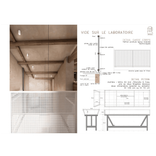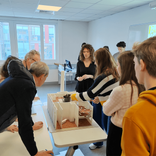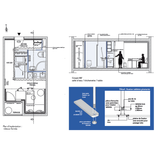Educational approach

ESAIL’s educational curriculum is designed to tap into and develop these skills, which students apply and synthesize in a number of projects. The level of synthesis increases with each passing year, ultimately guiding students toward a way of thinking that enables them to handle increasingly complex data. Upon graduating, students possess a diverse skillset that enables them to respond to the different situations they will encounter in their professional careers. This requirement of the profession is embedded in the curriculum. ESAIL maintains relations with the profession by inviting practitioners to give lectures, through mandatory internships at the end of each year and classroom exercises with real-world clients.
Our design studies program has been developed to mobilise and build the capacities of our students, which they are then able to put into practice by implementing their own projects.
Every year, the level of skill required will increase so that students gradually become capable of managing increasingly complex data.
The professions of interior architect and interior decorator address a wide variety of situations and issues. Our aim is to equip our students to comfortably deal with any case they are asked to manage, and to encourage them to develop their versatility and adaptability.
For both programs, the different subjects studied are grouped into skills units: the artistic unit, cultural unit, project unit and technical unit. Each unit develops the key skills required to exercise the profession concerned. Furthermore, our curriculum includes a number of compulsory internships which allow students to discover the practical realities of the profession during their studies. Each year includes an internship, the aim and duration of which changes depending on the year of study.

ESAIL’s mission is centred around the following principles:
- Develop the work skills and methods valued in the business world.
- Develop intellectual openness: inquisitiveness, research skills, sense of initiative and independent thinking.
- Develop students’ personalities, a fundamental part of this type of education.
- Develop students’ ability to adapt and respond to changes.
- Promote students’ understanding of the business world and help them embark on their careers.

Teaching methods and resources used
- Class sizes are limited to 20 students to guarantee that all students benefit from individual attention.
- Emphasis on tutoring for degree projects.
- A large number of speakers are invited to speak throughout the project part of the curriculum to promote open-mindedness in the discipline and the development of individual personalities.
- Documentary and bibliographic resources with the development of technology-enhanced learning tools: internet access, subscription to the materials library, e-campus and email.
- Use of publications and exhibitions to showcase students’ work.
- A strong relationship with the professional sector and local institutions: list of companies offering internships, alumni magazine, creation of partnerships, etc.